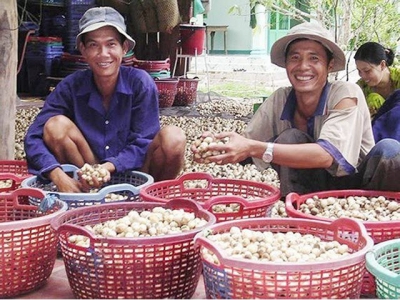Mekong, south-east regions advised to develop mushroom farms

Ho Chi Minh City - The Mekong Delta and south-eastern regions have great potential for growing mushroom year round thanks to their favourable climate and availability of vast quantities of agricultural by-products that can be used as inputs, according to the National Agricultural Extension Centre.
The Mekong and south-eastern regions have great potential to grow medicinal and edible mushrooms all year, according to the National Agricultural Extension Centre. (Photo: sggp)
Besides, farmers in the regions basically know all about mushroom breeding techniques and cultivation of straw, fungus, button and oyster mushrooms while the demand for the fungus has been growing gradually.
Tran Van Khoi, acting director of the centre, told a forum on hi-tech mushroom production held recently in An Giang province that it has developed in southern provinces, generating good incomes for farmers.
They grow 16 kinds of mushrooms with an annual output of 250,000 tonnes, earning 25-30 million USD from exports.
Oyster mushrooms fetch 2,600 USD per tonne, which is higher than from other agricultural products, besides which mushroom cultivation helps use up a large quantity of agricultural residues and creates employment, Khoi said.
The Mekong and south-eastern regions have farming residues like straw that could be used to grow mushrooms, but production of the fungi is well below potential because of poor use of technology.
Le Quang Thai of the Nacentech Technology and Business Incubator Centre, said the diversity of edible and medicinal mushrooms in Vietnam is still poor.
The use of technology, such as environmental sensors and automation, has not been considered, he said.
The biggest problem is in the area of post-harvest preservation technologies since mushrooms are mainly consumed fresh or dried and salted for export within 24 hours after harvest, he said.
Mushrooms are mostly still cultivated manually in traditional ways since farmers do not know they can improve productivity with technology, he said.
They should use technologies more to increase production of high-quality mushrooms, he added.
Related news
 Vietnam’s rice exports drop, causing big worries
Vietnam’s rice exports drop, causing big worries Over the last 10 years, rice exports have brought $2-3 billion to Vietnam a year. However, they are facing difficulties in nearly all key markets this year.
 Unstable export rice
Unstable export rice The quality of rice exports is not high, which is the main reason that Vietnam's rice exports remain precarious, especially when importing countries change
 ‘New plant breeding methods should not be considered GMOs’
‘New plant breeding methods should not be considered GMOs’ Plant breeding innovations need to be treated differently to GMOs in order to leverage their potential to contribute to sustainability goals